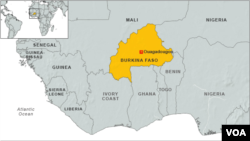Burkinabe officials contacted by AFP did not comment on the allegation, which the New York-based group described as "among the worst army abuse in Burkina Faso since 2015."
"These mass killings ... appear to be part of a widespread military campaign against civilians accused of collaborating with Islamist armed groups, and may amount to crimes against humanity."
It said: "Soldiers killed 44 people, including 20 children, in Nondin village, and 179 people, including 36 children, in the nearby Soro village, of Thiou district in the northern Yatenga province."
The West African nation has been battered by a jihadist insurgency that swept in from neighboring Mali in 2015.
Thousands of civilians, troops and police have been killed, two million people have fled their homes and anger within the military at the mounting toll sparked two coups in 2022.
"The massacres in Nondin and Soro villages are just the latest mass killings of civilians by the Burkina Faso military in their counterinsurgency operations," said Tirana Hassan, executive director of Human Rights Watch.
"The repeated failure of the Burkinabe authorities to prevent and investigate such atrocities underlines why international assistance is critical to support a credible investigation into possible crimes against humanity," Hassan said.
HRW said it had interviewed 23 people, including 14 witnesses to the killings, three local civil society activists, and three members of international organizations.
"Human Rights Watch verified videos and photographs shared by survivors of the aftermath of the killings and injured survivors," it said.
Mass graves
On February 24 and 25, Islamist armed groups carried out several attacks on military targets, including barracks and bases, and on civilian infrastructure, such as religious sites, killing scores of civilians, soldiers and militia members.
Burkinabe Defense Minister Mahamoudou Sana on February 26 denounced "simultaneous and coordinated" attacks by Islamist fighters but made no mention of the mass killings of civilians in Nondin and Soro.
On March 1, Aly Benjamin Coulibaly, prosecutor of the high court Ouahigouya, the capital of Yatenga province, said he had received reports of "massive deadly attacks" on the villages of Komsilga, Nodin and Soro in Yatenga province with a provisional toll of "around 170 people executed" and others injured, and that he ordered an investigation.
Coulibaly said villagers had recounted that "military forces first stopped in Nondin, then in Soro, five kilometers (three miles) away."
"They believe that the killings were perpetrated in retaliation for an attack by Islamist fighters against a Burkinabe military and militia camp outside ... Ouahigouya, about 25 kilometers from Nondin, earlier that day," he said.
"Before the soldiers started shooting at us, they accused us of being complicit with the jihadists," a male survivor from Soro who was shot in the leg said.
"They said we do not cooperate with them (the army) because we did not inform them about the jihadists’ movements."
Witnesses said that survivors and people from nearby villages buried the bodies in Nondin in three mass graves.






Forum